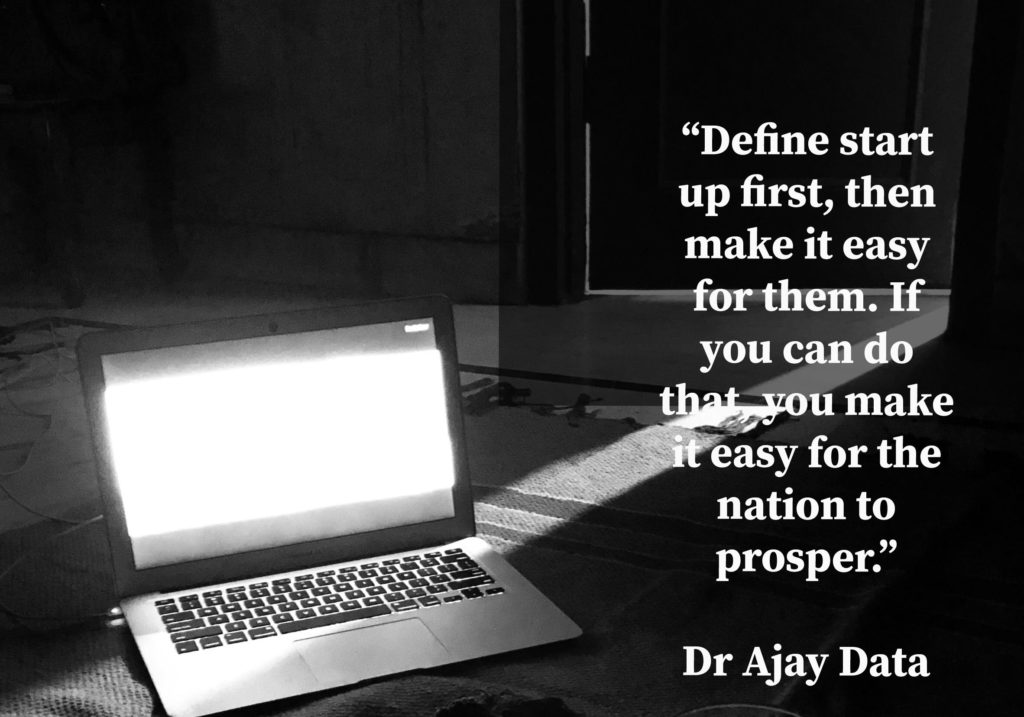Make It Easy policy for startups to flourish. Digital economy can’t be a slave to bureaucratic pace
4 min read
By Dr. Ajay Data, Founder & CEO, Data Xgen Technologies
After listening in on Finance Minister Nirmala Sitharaman’s budget 2019 speech, I shall admit I see hope for the youth in the country. There is an unmistakable push by this government in improving and expanding the skill sets of the youth in newer areas such as artificial intelligence, Big Data and Robotics, among other under-explored areas.
It is overwhelming to see how the government is taking steps to realise the dream of Digital India and acknowledging its critical role in changing the lives of the people across the country. It is equally inspiring on the government’s part to put in increased efforts to improve the skills of our youth in the said areas. This, I believe, will pave the way for higher-paying jobs and lucrative career opportunities for our youth both within and outside the country.
The finance minister’s extension of relief to the start-ups hasn’t gone unnoticed. Most start-ups suffer from lack of ease of doing business in India. That the government chose to address this issue in the budget is as noteworthy as it is a reminder of the hurdles that the start-ups have to cross, jump and dodge to establish themselves as an entreprise of promise.
The FM has dedicated an exclusive channel that will stream programme and content on startup and has promised to have it administered by startups. While these moves are encouraging they fall critically short of accomplishing their goals in the absence of definitives.
I am a mentor to startups and am, therefore, aware of on-ground issues affecting their operations. The resolve to address angel tax issues is appreciable but the government has not made mention of any policy parameter for allocation towards funding startups. I’m talking of omissions in the fine print, figures that speak in black and white and don’t leave us assuming the nature of assistance that the government is willing to extend to let the startups see the light of the day.

We are looking at a future which is going to be digital everything and digital everywhere. In such a scenario we have to be a step ahead of our competition, our country next door. We cannot afford to be tied up in bureaucratic excuses when the digital word is reinventing itself which each passing day.
An example will underline my concern. While the world is still absorbing the benefits accruing from Internet 3.0, we have already begun to usher in Internet 4.0, the next generation of inclusive Internet aimed at capacity building by breaking the language barrier. In my write up published in Entrepreneur India I have mentioned how there is a need to push internet content in Indian languages. The internet 1.0 was the one without Web. The 2.0 version gave us the World Wide Web or the more universally recognised www extension, which provided us the much-needed network connectivity and access to content from anywhere and at anytime.
The next generation Internet 3.0 gave us highly personalised access and dissemination of information by building a seamless platform of connectivity through mobile phones and portable devices. We have gone one step ahead with Internet 4.0, which not only breaks the language barrier in both areas – content and access – but also gives users the freedom of choice to communicate, collaborate and create content in the medium they are comfortable with. This revolutionary transformation in the internet space makes us a more diverse and inclusive world.
It is promising to see that the government has proposed to extend the lower rate of 25% Corporate Tax to all companies with an annual turnover up to Rs400 crore. Earlier, this rate was applicable to companies worth Rs 250 crore. Lowering the corporate tax rate to 25 % for 99.3% of companies in the country is a very positive step that builds hope for a better tomorrow.
However, contrary to the expectations, the Budget 2019-20 has turned out to be a disappointment to the Indian IT sector. As has happened in the case of startups there wasn’t any mention of support to the software product companies. Here’s what the government can do to deliver on its promises in the budget speech:
- Targeted approach to help float and fund 1 million startups
- Every major district in the states should be tasked with the target on encouraging and recommending worthy startups.
- We need to create job givers rather than job seekers to solve issues we are facing. Startups are an answer to that. Therefore, I advocate that they must be given free run for 5 years.
- The government needs to clearly define startup. There is ambiguity around what a startup is. This will help in dovetailing of existing policies with new ones while enabling the government and its workforce to identify the real and deserving beneficiaries.
- Startups need to have supporting policies, which should offer flexible solutions in equity structures, funding, employment, intellectual property rights, statutory compliances and closing of startups.
- Make it Easy for startups. Make it easy for the nation to flourish.






